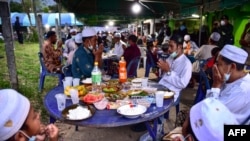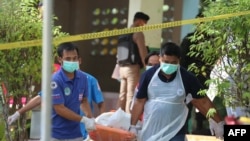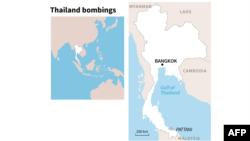A tenuous truce between the Thai government and armed separatists in the country’s far south and a deal to discuss some of the rebels’ core concerns are spurring hopes of progress toward a lasting peace after years of sputtering talks, despite a rebel attack in the region Friday.
The two sides met face to face in Malaysia on March 31 and April 1 for the first time since the start of the pandemic. They agreed to mark the Islamic holy month of Ramadan with an informal cease-fire, to run from April 3 to May 14, and to set up three joint working groups on reducing violence, consulting the public and hashing out “political solutions” to the conflict.
The separatists have been fighting to make an independent state of Buddhist-majority Thailand’s predominantly Malay Muslim southern provinces, which comprised the sultanate of Patani when Britain handed them over to what was then the kingdom of Siam in 1909.
More than 7,300 people have been killed in related violence since the occasional bouts of rebellion flared up again in 2004. Official peace talks started nine years later.
“If this becomes a peaceful Ramadan, then I think it will build confidence on both sides,” said Rungrawee Chalermsripinyorat, a lecturer at the Peace Studies Institute of Thailand’s Prince of Songkla University.
If they can manage that, she added, they might then negotiate a more formal, long-term cease-fire and even move on finally “to discussion on the substantive matters.”
She and other analysts told VOA last week that the truce, while fragile and lacking official monitors, appeared to be holding.
On Saturday, however, a rebel group affiliated with the Patani United Liberation Organization, which was left out of the talks, reportedly claimed responsibility for bombings in Pattani province the day before that killed a civilian and injured three police officers. The government’s negotiating team told VOA Sunday that the truce was still in effect.
Paradigm shifts
The Thai government struck the Ramadan deal with Barisan Revolusi National, the largest and most active of the rebel groups.
Rungrawee said the government seems to be giving up its narrative that BRN and the rest are no more than criminal gangs.
“They were trying to delegitimize the people who have undertaken this armed resistance, so to state it clearly that this is a political problem that needs a political solution, I think it is an important shift on the part of the government,” she said.
Matthew Wheeler, Southeast Asia senior analyst for the International Crisis Group, a Brussels-based think tank, said openly treating the conflict as a political problem could help pave the way toward something short of independence for the southern provinces.
“Presumably a political solution would involve ... some change to the existing relationship between local people in the southernmost provinces and the state, so that suggests some sort of decentralization or devolution of political power,” he said. “But what form that’s going to take, when it would happen, all of that is yet to be determined.”
Neither side has gone public with the full text of the Ramadan deal. But Wheeler said the statement the Thai government issued just after the meeting did refer to a “Patani community,” possibly the first time it has conceded the existence of a distinct cultural identity born from the old sultanate.
“National identity has been so central to the nation-building concept in Thailand in the modern era, and that’s encapsulated in the [national] slogan of ‘nation, religion and monarchy,' which of course is something that this government champions. So, to acknowledge a subnational identity I think is an important step,” he said.
The same statement also says that both sides agreed to aim for a settlement that respects “the Unitary State of Thailand in accordance with the Constitution.” The first article of the constitution says the country is “indivisible.”
Wheeler said that suggests BRN itself may be willing to consider something short of independence, at least for now.
Having a senior figure from BRN’s military wing at the table for the first time, a man known by the alias “Deng Awaeji,” also signals that the peace talks are finally being taken seriously by more than just the group’s political wing, Rungrawee said.
“This is a major issue for the Thai government,” she said. “They want to know whether there is buy-in from the military wing or not, because they are doubtful that the people who come to the dialogue table have command and control over the militants on the ground.”
To the extreme
Observers still see a long and winding road ahead for the peace talks, though, with potential pitfalls that may yet derail the process.
Don Pathan, a Thailand-based security analyst who has been following the conflict for decades, said BRN political leaders seem to be giving way on the group’s long-held goal of independence for the southern provinces without first convincing their rank-and-file fighters to go along.
He said both the Thai government and BRN delegations to the latest meeting dodged pointed questions about BRN’s current stance on independence at their press conferences on April 1. BRN’s brief remarks to the media made no mention of adhering to the Thai constitution or the notion of a “unitary state of Thailand,” as the government’s statement did.
“That’s the worrying point right now,” Pathan said. “If the combatants feel that this point, independence, is off the table, has been compromised, I have a strong feeling that there could be a split, a splinter group created, because for the past 18 years they’ve been told that independence is a moral obligation.”
Any splinter group, he added, is likely to be more radical and violent.
Some research suggests that extremism may be rising in the ranks already.
Panitan Wattanayagorn, an adviser to Thailand’s National Security Council and special government envoy to the southern provinces, said that is the conclusion of a paper he co-authored on the insurgency and is soon to be published by Thailand’s Chiang Mai University. Despite an overall drop in violence for the past few years, he said his research and interviews suggest that the younger generations of fighters are, for example, more willing to die in combat and more likely to have their politics infused with religion.
If not tackled soon, he warned it could lead to a new spiral of violence and dampen the mood for more peace talks.
“There are a lot of political consequences ... if this thing is not handled properly at the national level,” Panitan said. “And in the end the Thai public will get even more nationalistic, you see, and like they always do maybe support more troops to the south, which is quite bad.”
The southern provinces have been living under heightened security measures for years already, with repeated accusations of human rights abuses by soldiers and police, including the torture and death of suspected insurgents in custody.






